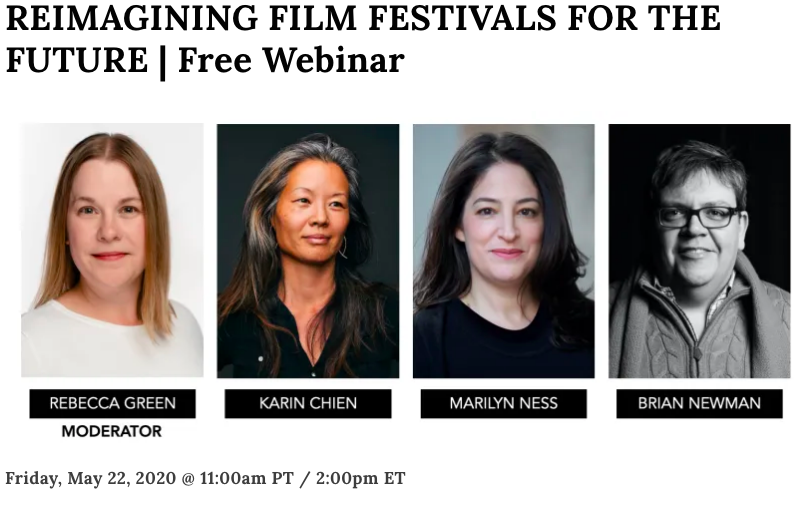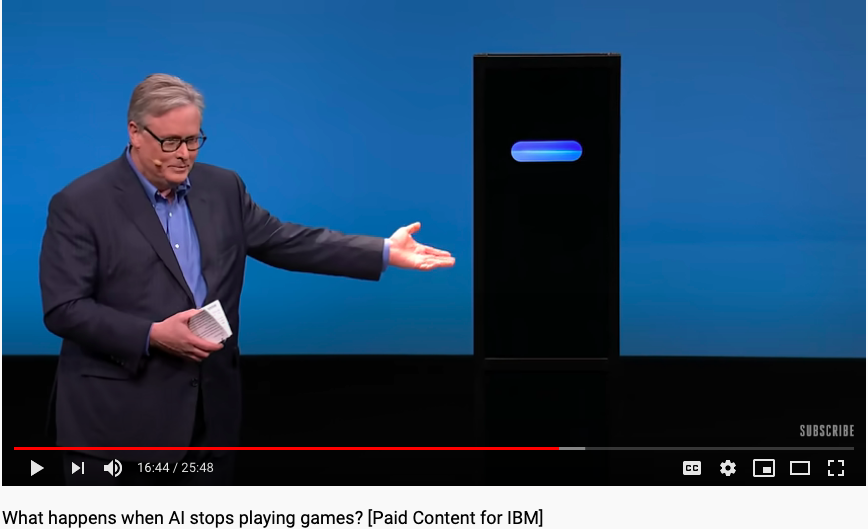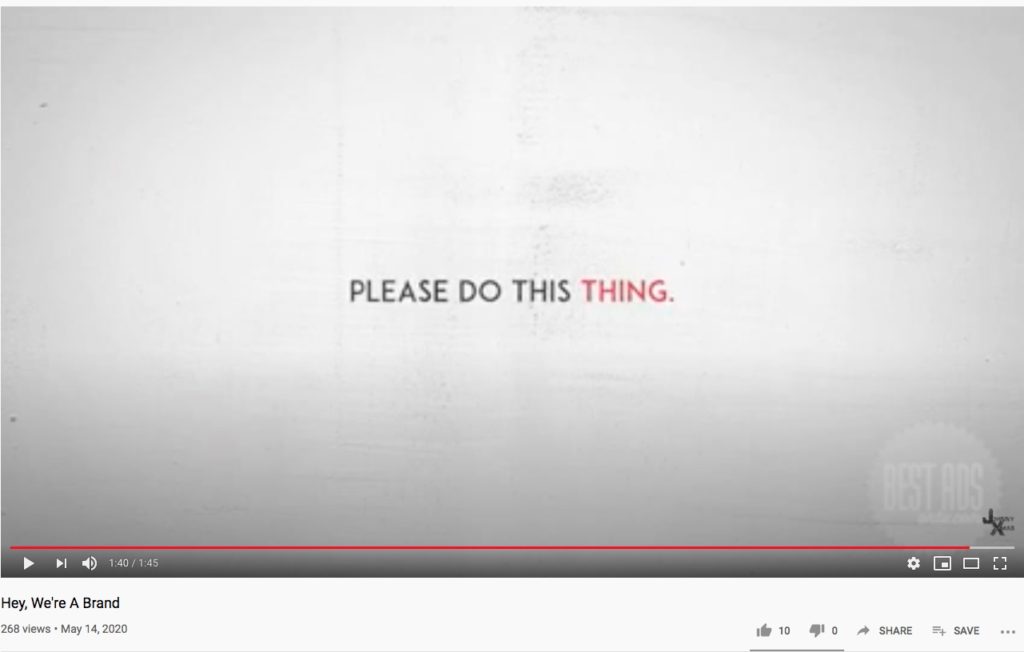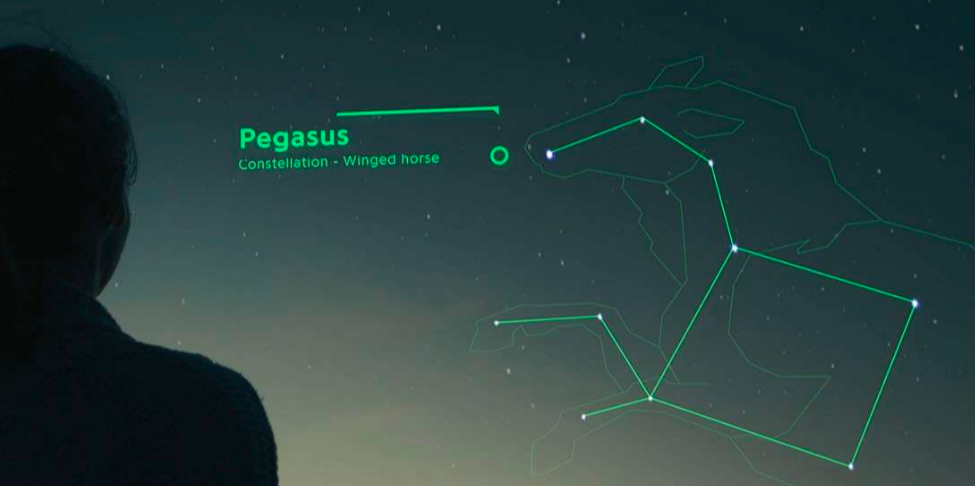
After I published my recent piece on film festivals (which also ran in IndieWire), I started having a discussion with Rebecca Green of the Dear Producer newsletter about many things, including what the film fest of the future might look like. She invited me to a panel she’s hosting on the subject – this Friday at 2pm ET – and you can register for it here. I’ll be joining a few people I think are among the smartest in the biz – Karin Chien, Marilyn Ness and Rebecca (moderating) to imagine what it would look like to re-imagine festivals in a way that helps everyone – the festivals, filmmakers and audiences.
One of the ways I’ve been thinking about this panel is – if festivals didn’t exist at all, what would we create from scratch? I think that helps frame the discussion in a different manner than usual. It’s also a question I asked in a post back in 2013 – and that I return to often- “The question should be, what do filmmakers need most now? And is what they need something that a festival can help with, or do we need to start something different to solve this need? If filmmakers got together in the same spirit that led them to create film co-ops and festivals (and filmmaker organizations, and magazines, and…) then what would they make together today?” Of course, festivals also must serve audiences, and they’re all trying to survive a global pandemic. But the hope is by asking what would be build that would be most helpful for filmmakers (all of whom are coming with different needs, too, btw), then maybe we can add these ideas to what gets built out of this crisis. It is one of many different conversations being had right now – I’ve been on two other zoom panels about it this week alone, and know of two more (at least), but it’s one I hope will be interesting.
Join us for the discussion on Friday.
Stuff I’m Reading: Film
10 Great Things about Online Film Festivals: Thom Powers wrote a good, well-researched piece for IndieWire on the good things about how film festivals are moving online. I agree with most of it as well, and think everyone should read it. As he says, many of the positive things being built should be kept in the future – especially the access it gives to more people to watch these films. I think he’s too rosy on the prospects that buyers are ok with this, because even just this morning some of those same distributors he mentioned told me the opposite. But I do hope he’s right that the situation is becoming more acceptable to some of them. Anyway, check it out.
10 Questions Every Filmmaker Should Ask About Online Film Festivals – Clay Pruitt over at Seed & Spark posted this piece about how filmmakers can weigh their options with online festivals. And while I am sure they see it as a corrective to my piece – I actually agree with 99.9% of everything he suggests, and you know what – reasonable, knowledgeable adults should be able to realize both viewpoints are not only compatible, but true right now, that’s called complexity. It also lines up pretty much with what I’ve been writing here for years (here’s one example from a few weeks ago, and one from 2010). While I don’t disagree with much of it, I do have a minor quibble with his ending – I don’t buy the argument that your decision impacts whether a festival lives or dies. Last time I checked, there are way more films applying to festivals than can be shown. The small percentage that have to turn them down for distribution reasons can’t possibly be large enough for that to be true.
Last, The Film Collaborative has been doing a series of conversations/posts about festivals/distribution during Covid – that are worth checking out. I just joined them earlier this week for one that should be posted here soon, maybe by the time this article runs. I joined Annie Roney and Cristine Platt Dewey of Roco Films, Tim Horsburgh of Kartemquin, and Jeffrey and Orly of the Collaborative to discuss the pros/cons of online fests and the impact on distribution. Read the report when it posts. Tim explains the evolution of their thinking with regards to festivals (more pro as time goes on), I elaborate on my post (and the misunderstandings of it), and Roco spoke about the interesting and great side-impact of covid on educational distribution, which is apparently opening in-roads for high school screenings that previously didn’t really exist.
The Climate StoryLab Report is Out: The folks at the DocSociety have held their second lab for climate change media, and their report is online now. It’s filled with research, case studies, best practices and more.
Coronairus Didn’t Kill Quibi, but these 8 things Might – says VanityFair. I think there are more than 8 things killing Quibi, but the two most important are at the head of the company. Good read though.
Stuff I’m Reading: Branded Content & Misc.

IBM Launches New Doc on AI on The Verge – Self-promotion alert, as I worked a bit on this project, but check out IBM’s Debater online at Vox. It’s a great little doc – which premiered at CPH:DOX – about an AI robot that can debate a human in real time.
Is Now The Best Time for Brands to Make Docs? I moderated this panel for BrandStorytelling this week – and yes, festivals came up even here – with three great guests. The thesis was that the market for docs produced by brands has only gotten better during covid. As cord-cutting increased as much as 43% last month, and more people move to streamers – who also need more content than ever – and consumers look for more authentic stories from brands, now is the time to consider moving marketing dollars into the space (after budgets come back, of course). The other panelists were: Rupert Maconick, producer of 5B for Johnson & Johnson (acquired by Verizon), and Lo and Behold for Netscout (Magnolia); David Charles Rodrigues, director of Gay Chorus Deep South, AirBNB’s first feature, purchased by MTV; and Lowell Shapiro, Founder, Black Box, an entertainment and management company, and DocBox, making documentary content for brands. It was a great, albeit brief, conversation. The stream should be up here by the time of this post.

hey, We’re a Brand PSA: And with so many ads that feel like this amazing spoof, it’s definitely a time to consider more authentic content than advertising.
How Advertisers are Using TikTok during the Recession: A good example being: “Procter & Gamble’s Distance Dance sponsored challenge with dancer Charlie D’amelio on TikTok last month has generated over 14 billion views since it launched last month. That’s on the back of ad format that costs $150,000.” DigiDay Reports.

AR Contact Lenses Coming Soon: Mojo Vision is raising money for a contact lens that let’s you use AR technology to do lots of crazy stuff. Digital Trends reports. Ok, it might not come soon, but I can’t wait, as I still hope to build a program that let’s me replace all advertisements with art sometime in the future.
Social tagging: Advertising > AI > AR > branded content > climate > Dear Producer > documentary > festivals